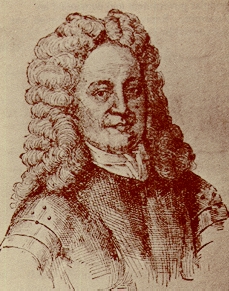
-
Samuel Vetch 1
(1668-1732).

Vetch came from a respected Edinburgh family, the second son of William Vetch, a leading Presbyterian minister. He and his older brother William gained military experience against the French in the fields of Flanders. With the Treaty of Ryswick in 1697 the brothers came to North America in order to fulfill the dream of a Scottish financier by the name of William Paterson (1658-1719); the "Darien Scheme." Paterson had made a name for himself in financial circles and had founded the Bank of England being one of its first directors in 1694. The supporters of the Darien Scheme, with the golden Spanish example on their minds, called initially for an English settlement in Central America and turning it into an entrepot of trade between the eastern and western parts of the world which short of the isthmus connecting North and South America was effectively cut off by a unimaginably huge and uncrossable land mass of the Americas. The tale of these enthusiastic adventure seekers in the jungles of Central America is separate from the one we tell at this place, but sufficient here to say that the tropical elements defeated the expedition. For the Vetch brothers it had to be a miserable and disappointing experience, indeed the older Vetch brother died in the effort.2
We pick up with Samuel Vetch in the year 1699, seeing him sailing into New York harbour with the starving survivors of the failed expedition. Vetch was much refreshed by what he found in New England especially after his wretched experience in the tropics. This young and viral Scottish officer was not to be kept down and soon he and the high society of New York were sufficiently impressed with one another, such that Vetch stayed on; and, in 1700, he married Margaret Livingston a member of a successful merchant family, a family of Scottish origins.3
Sam got himself involved in the family's business and soon found that the most profitable trading was to be had by dealing with the French at Quebec -- never mind that this constituted trading with the enemy.